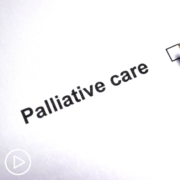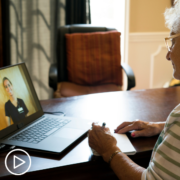How Can Palliative Care Help People With Prostate Cancer?
How Can Palliative Care Help People With Prostate Cancer? from Patient Empowerment Network on Vimeo.
Some prostate cancer patients may receive palliative care, but how is it used exactly? Expert Dr. Tanya Dorff explains research studies about palliative care and how it can be used to improve quality of life for patients.
Related Resources:

|

|

|
Transcript:
Katherine:
What is palliative care, and how can it help men with prostate cancer?
Dr. Dorff:
Palliative care is something that we think about more towards the end of life, where we’re focusing on cancer symptoms more than treating cancer. However, some studies have shown – very prominent studies – that early palliative care in some malignancies is associated actually with better survival, meaning that paying attention to the patient’s symptoms is actually a really important part of keeping them well and keeping them alive as we treat the cancer.
So, more and more, we’re starting to integrate palliative care earlier in the disease.
I think that can sometimes signal a little alarm for patients – “Oh, I’m being referred to palliative care, that means my doctor doesn’t really think they can treat my cancer anymore” – and it’s gonna take some education to really help people transform their thinking about palliative care as a strategy that’s not for the end, but something that really should be part of our treatment all along.
So, our palliative care team, or what we call supportive medicine at City of Hope, uses treatments to manage pain. They have a broader spectrum, they’re more focused on all the different modalities to treat pain, so an oncologist or urologist can treat pain, but when we refer to palliative or supportive medicine, you get just that extra expertise, especially if people are having a lot of side effects from pain medicines, but our supportive medicine doctors aren’t only pain management doctors.
They help with other symptoms, like nausea or constipation, to some extent urinary symptoms for my prostate cancer patients, although we rely heavily on urology for that, and also just the existential, or spiritual, or emotional components.
Our supportive medicine team typically includes not only an MD, an advanced practice provider like an NP, but also someone from psychology, someone from social work, because dealing with cancer is really stressful and challenging, and in an ideal world, palliative care is not only taking care of the symptoms of the cancer that are physical, but also helping the whole being, the whole family unit that’s going through this experience have less emotional distress as well.










